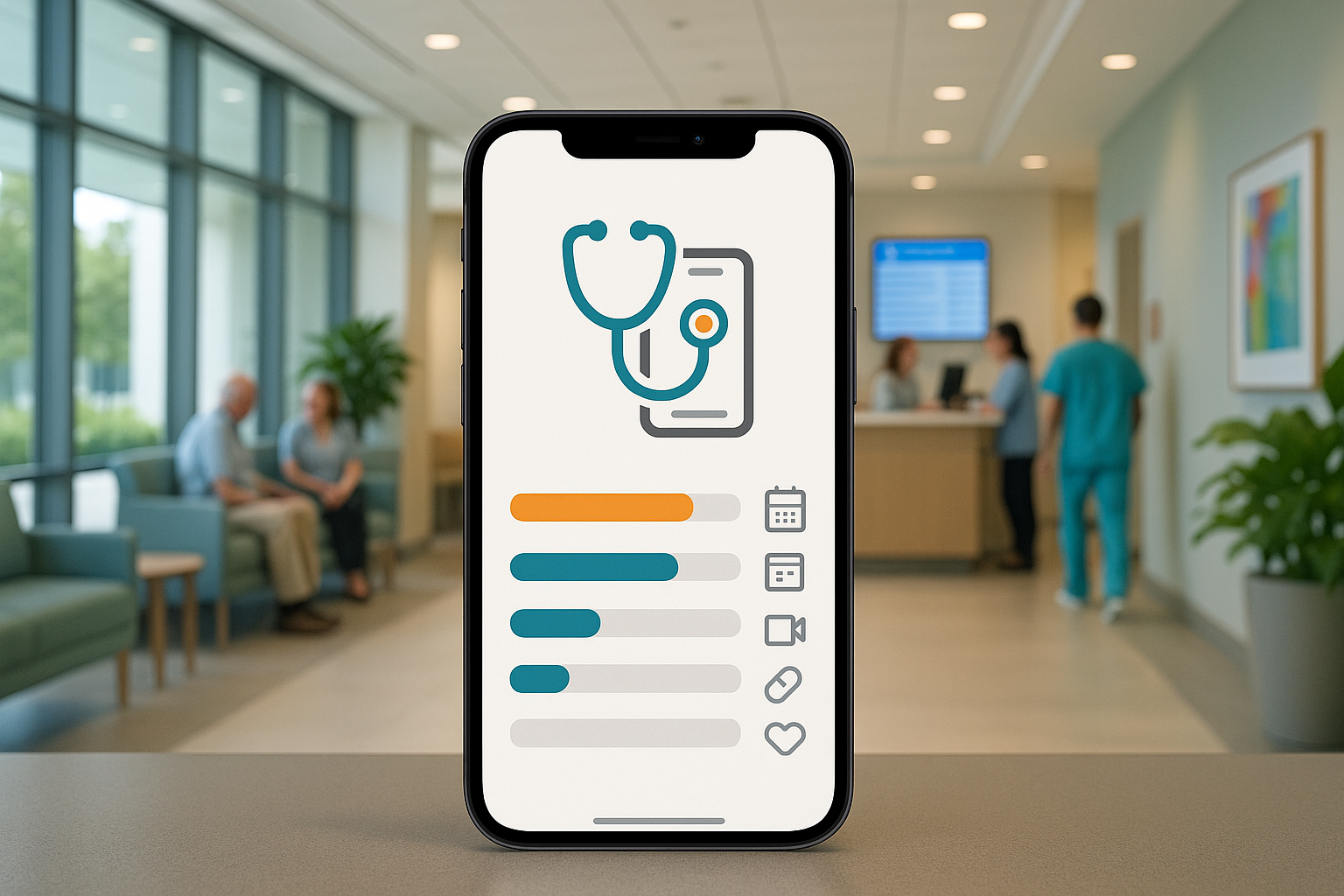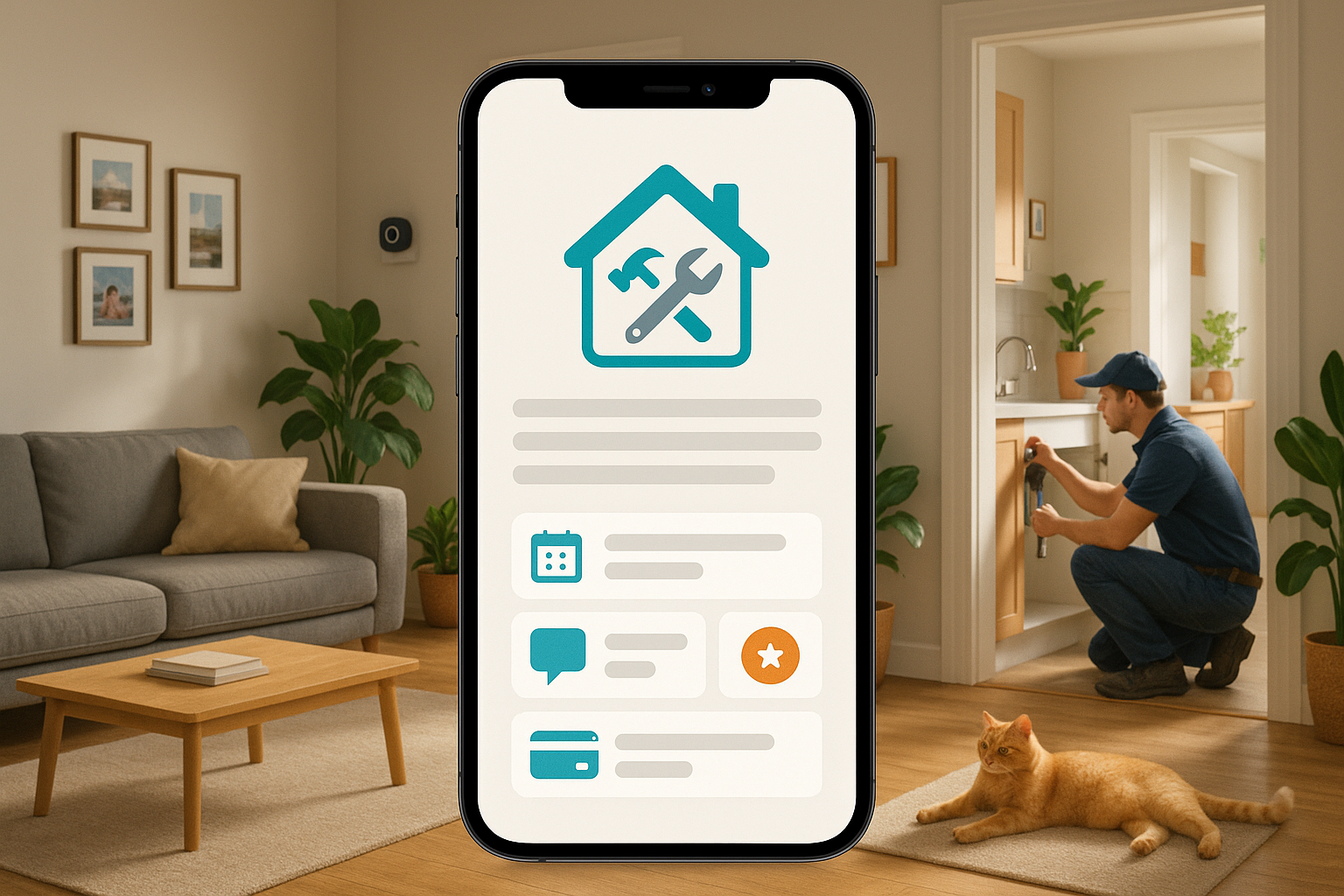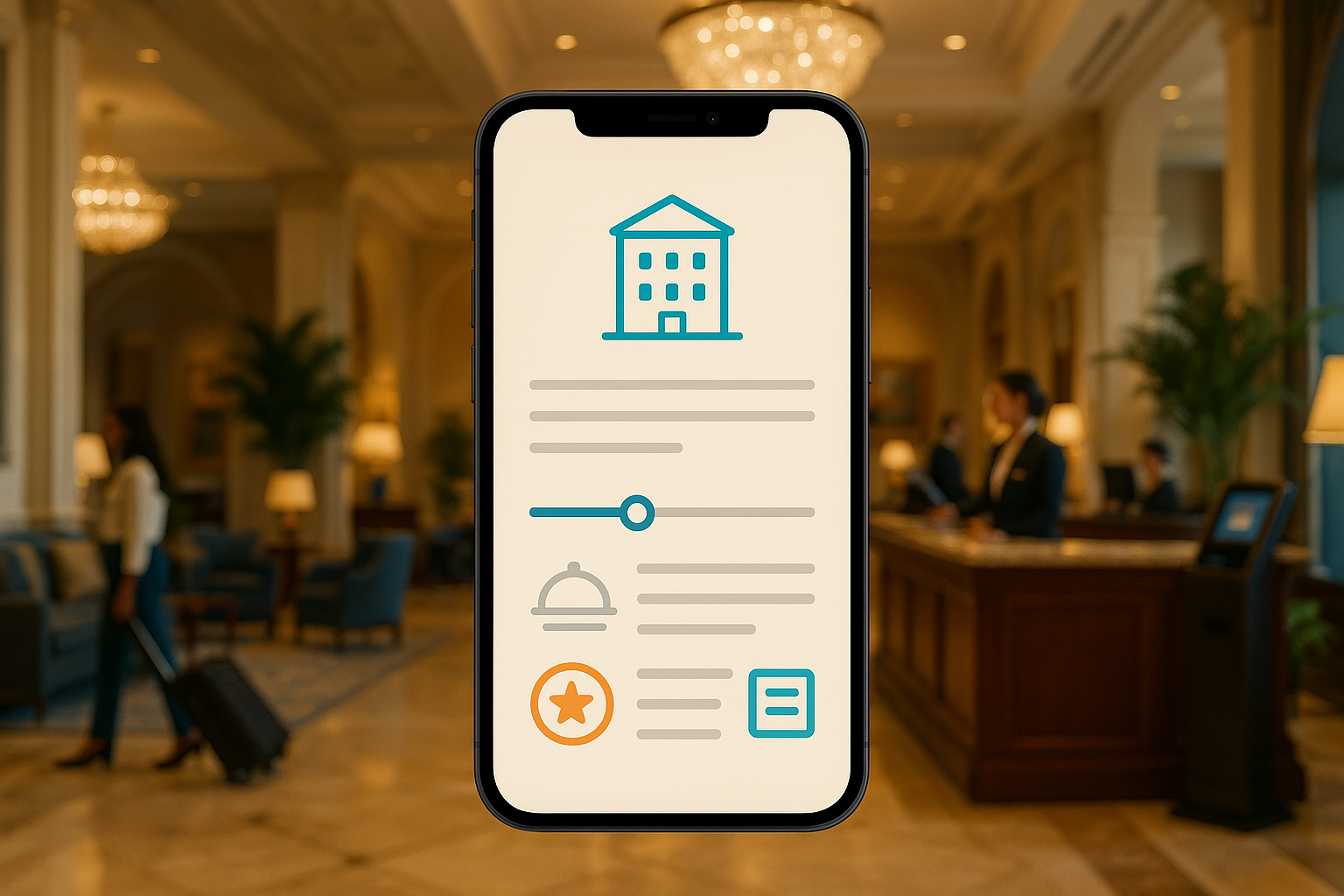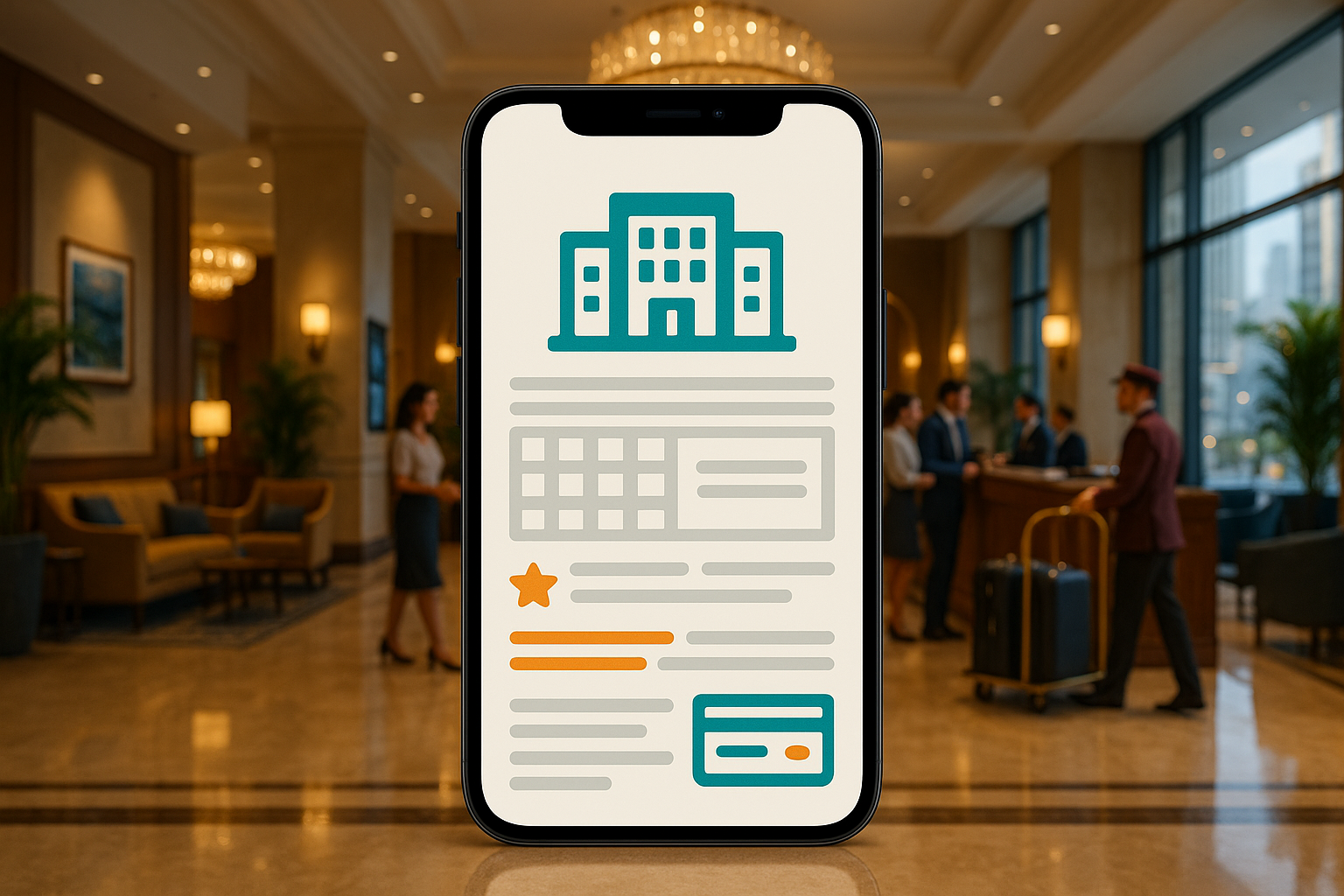Introduction
In an era of digital transformation, the healthcare sector is undergoing a profound shift. Patients increasingly expect the same level of digital convenience from their healthcare providers as they do from retail or banking. This has led to a surge in demand for hospital mobile applications designed to improve patient engagement, streamline clinical workflows, and enhance administrative efficiency. However, developing such an application is far from simple. It presents a unique set of challenges, including stringent data security regulations like HIPAA, the need for seamless integration with complex Electronic Health Record (EHR) systems, and the critical requirement for data accuracy.
Attempting to build a hospital app in-house can quickly become a drain on resources, exposing an organization to significant compliance risks and technical debt. The specialized expertise required is often beyond the scope of a typical IT department. This article serves as a comprehensive guide to hospital app development. We will explore what a hospital app entails, the inherent difficulties of in-house development, the various types of applications available, and the associated costs. We will also provide a curated list of top development companies that can navigate these complexities for you.
As a leading US-based, AI-powered mobile app development firm, we at MetaCTO have over 20 years of experience turning ambitious ideas into successful, market-ready applications. We understand that building a hospital app is not just a technical project but a strategic initiative that impacts patient care and operational success. Throughout this guide, we will share insights on how partnering with an expert agency like ours can help you overcome the hurdles and build a high-performance application that delivers tangible value.
What is a Hospital App?
At its core, a hospital app is a software application designed for mobile devices to serve the interconnected needs of patients, medical staff, and hospital administrators. It acts as a central digital hub, facilitating smoother communication, providing on-demand access to information, and automating key processes that were once manual and time-consuming. These applications are not merely a convenience; they are powerful tools that can fundamentally improve the quality of care and operational efficiency.
The functionality of a hospital app is multifaceted, catering to its diverse user base. For patients, the app becomes a gateway to managing their own healthcare journey. It makes it easier to access personal medical records, supports remote consultations through telemedicine features, and simplifies administrative tasks. Key features for patients often include:
- Appointment Scheduling: Patients can view doctor availability and schedule their own visits without needing to call the front desk.
- Access to Health Records: Users can view lab results, see their prescription history, and manage their overall medical records directly from their phone.
- Medication Management: The app can send push notifications as reminders for taking medication or for prescription refills, improving adherence to treatment plans.
- Secure Communication: A secure, encrypted chat feature allows patients to message their healthcare professionals with minor concerns or questions, reducing the need for in-person follow-ups.
- Telemedicine: Patients can engage in remote video consultations with doctors, receive digital prescriptions, and have their health tracked remotely.
For doctors, nurses, and other hospital staff, these apps are critical workflow optimization tools. They provide mobile access to the information and communication channels needed to deliver effective care. Features designed for staff include:
- Mobile EHR Access: Doctors and nurses can securely access patient records on the go, allowing for more informed decision-making at the point of care.
- Internal Communication: Real-time, secure messaging helps staff communicate instantly with colleagues, coordinating care more effectively.
- Shift Tracking: Staff can track their shifts and schedules, simplifying workforce management.
- Operating Room Scheduling: A dedicated system allows surgeons and nurses to see available operating room slots, book surgeries, and receive instant updates on any changes.
Finally, hospital management apps provide administrators with a high-level view of hospital operations, enabling data-driven decisions to improve efficiency. These apps help administrators oversee staff schedules, track crucial inventory like medical supplies, and analyze data to improve patient flow throughout the facility.
Modern hospital apps are also integrating advanced technologies like AI-powered chatbots for patient support, Augmented Reality (AR) for medical training, and integrations with the Medical Internet of Things (MIoT) through wearable devices to monitor patient vitals remotely. By bringing these functions together in a secure, user-friendly interface, a well-designed hospital app can transform the healthcare experience for everyone involved.
Reasons It Is Difficult to Develop a Hospital App In-House
While the prospect of maintaining full control over a development project is appealing, building a hospital application in-house is fraught with challenges that can lead to delays, budget overruns, and critical compliance failures. The healthcare domain demands a level of specialized knowledge that is rarely found in a single, non-specialized IT team. Here are some of the primary difficulties.
The Challenge of Data Accuracy and Monitoring
One of the main problems developers face is ensuring the accuracy of health data collected by the app. A hospital application must provide software solutions for continuous health monitoring and early disease warnings. However, the data obtained from a standard smartphone at a specific moment cannot be considered the most accurate. A smartphone’s design does not include specialized sensors that can provide reliable data for an accurate medical prediction. This limitation means that for an app to be clinically useful for monitoring, it cannot rely on the phone’s built-in hardware alone.
Complex Integration with External Medical Devices
To overcome the data accuracy problem, a hospital app must be able to support and synchronize with external, specialized medical sensors. These certified devices, which need to be in direct contact with the user to gather reliable data like blood pressure or glucose levels, require a robust and secure integration architecture. Building these support functions for data synchronization and transmission is a complex engineering task. It requires deep expertise in both hardware and software interoperability, a skill set that many in-house teams lack.
Stringent Security and HIPAA Compliance
Healthcare data is among the most sensitive personal information, and it is protected by strict regulations like the Health Insurance Portability and Accountability Act (HIPAA) in the United States. A data breach can result in severe financial penalties and irreparable damage to a hospital’s reputation. Building a HIPAA-compliant app requires a multi-layered security strategy, including:
- End-to-End Encryption: All data, both in transit (messaging) and at rest (storage), must be encrypted.
- Strong Authentication: Implementing multi-factor authentication (MFA) and biometric login options is essential to ensure only authorized users can access data.
- Role-Based Access Control (RBAC): The system must restrict data visibility based on a user’s role, ensuring that a patient cannot see another patient’s records and a nurse cannot access administrative financial data.
- Continuous Monitoring and Auditing: The app requires real-time threat detection, regular security audits, and vulnerability assessments to protect against evolving cyber threats.
Developing and maintaining this level of security is a continuous, resource-intensive process that demands dedicated cybersecurity expertise. As an example, the SynApp developed by NMG Technologies required the implementation of end-to-end encryption and two-layered access specifically to protect medical workers from severe HIPAA penalties.
Interoperability with Legacy Systems
A hospital app does not operate in a vacuum. It must seamlessly integrate with the hospital’s existing technology stack, most importantly the Electronic Health Record (EHR) or Hospital Information System (HIS). These systems are often proprietary and complex, with limited or poorly documented APIs. For an app to function correctly—pulling patient records, updating appointment schedules, or pushing lab results—it must achieve interoperability. This frequently requires the development of custom API integrations, a task that demands highly skilled engineers with experience in navigating and connecting disparate systems.
Hiring an expert development agency like MetaCTO mitigates these risks. We bring over two decades of experience in building secure, compliant, and highly complex applications. Our team includes specialists in AI, cloud architecture, and cybersecurity who understand the unique demands of the healthcare industry. We handle the intricacies of third-party integrations and HIPAA compliance, allowing you to focus on your core mission: providing excellent patient care. Explore our Custom Mobile App Development service to see how we can build a solution tailored to your needs.
Different Types of Hospital Apps
Hospital applications are not a one-size-fits-all solution. They can be categorized into several distinct types, each designed to address specific needs within the healthcare ecosystem. Understanding these types can help a healthcare organization identify the kind of solution that will provide the most value.
Patient Portals
Patient portals are perhaps the most common type of hospital application. They are patient-centric platforms that empower users to take an active role in managing their health. These apps serve as a comprehensive resource for patients, allowing them to perform a wide range of tasks from the convenience of their smartphone. Core features include:
- Booking virtual appointments and scheduling in-person doctor’s visits.
- Viewing lab results and prescription information.
- Receiving automated reminders for medications and appointments.
- Communicating with healthcare professionals through secure messaging.
- Managing and accessing their personal medical records.
Doctor and Staff Apps
These applications are designed specifically for the internal hospital workforce, including doctors, nurses, and other clinical staff. The primary goal is to improve clinical workflows, enhance communication, and provide mobile access to critical patient information. Key functionalities often include the ability for doctors and nurses to access patient records on the go, track their work shifts, and communicate instantly and securely with colleagues for better care coordination.
Emergency and Urgent Care Apps
In critical situations, time is of the essence. Emergency and urgent care apps are built to streamline the process of receiving emergency medical help. These applications can help a patient find the nearest hospital, provide real-time updates on emergency room wait times, and even allow first responders to communicate with the hospital before the patient arrives. For example, the Pulsara app lets paramedics send vital patient information, such as ECGs and photos, directly to the emergency department, giving the hospital team crucial time to prepare.
Telemedicine Apps
Telemedicine, or telehealth, has become an essential component of modern healthcare delivery. Telemedicine apps facilitate remote medical care, breaking down geographical barriers between patients and doctors. Through these platforms, patients can:
- Consult with doctors via secure video calls.
- Receive digital prescriptions sent directly to their pharmacy.
- Track their health conditions remotely using integrated monitoring tools.
Hospital Management Apps
This category of app is targeted at hospital administrators and management personnel. The focus is on the business and operational side of running a hospital. These apps provide tools to oversee staff, track inventory levels of medical supplies and equipment, and analyze data to improve patient flow and reduce wait times, ultimately optimizing the hospital’s overall efficiency and resource allocation.
AI Chatbots and Virtual Assistants
While often a feature within other apps, AI chatbots and virtual assistants can also function as standalone applications. They leverage artificial intelligence to handle a variety of tasks without human intervention. These bots can answer common patient questions, help with appointment scheduling, and send out automated medication reminders, freeing up administrative staff to focus on more complex issues.
Cost Estimate for Developing a Hospital App
Determining the exact cost of developing a hospital app is challenging, as it depends on a multitude of factors. However, based on industry analysis, the approximate cost for a Hospital Management App ranges from $50,000 to $200,000. This wide range reflects the varying complexity and scope of such projects.
Several key factors influence the final cost:
- Feature Complexity: The number and complexity of features are the biggest cost drivers. An app with basic appointment scheduling and information display will cost significantly less than a comprehensive platform with real-time EHR integration, AI-powered diagnostics, telemedicine video streaming, and AR-based training modules.
- Platform Support: The cost will increase depending on whether you choose to build a native app for a single platform (iOS or Android), native apps for both, or a cross-platform application. While cross-platform development can sometimes be more cost-effective, native apps often provide better performance and a more seamless user experience, which may be critical for a medical application.
- Integration with Third-Party Systems: As mentioned, integrating with existing hospital systems like EHR, HIS, and billing platforms is a complex and therefore costly part of the development process. Custom API development is often required, which adds to the timeline and budget.
- Security and Compliance: Ensuring HIPAA compliance is non-negotiable, but it is not a simple checklist. It involves rigorous security architecture design, continuous monitoring, and regular audits, all of which contribute to the overall development and maintenance costs.
- UI/UX Design: A well-designed, intuitive user interface is crucial for adoption by both patients and staff, who may not be tech-savvy. Professional UI/UX design is an investment that pays off in user engagement but adds to the upfront cost.
At MetaCTO, we recognize that not every organization can commit to a six-figure investment from the outset. That’s why we offer services like our Rapid MVP Development, where we help you launch a streamlined version of your app in 90 days or less. This approach allows you to validate your concept with real users, gather feedback, and secure stakeholder buy-in before committing to the full-scale development of a more feature-rich application.
Top Hospital App Development Companies
Choosing the right technology partner is arguably the most critical decision you will make when building a hospital app. The right company will bring not only technical expertise but also a deep understanding of the healthcare industry’s unique regulatory and operational landscape. Below is a list of top companies specializing in healthcare and hospital app development.
| Rank | Company | Key Services/Focus | Reviews |
|---|---|---|---|
| 1 | MetaCTO | AI-enabled mobile app design, strategy, and development. Rapid MVP development in 90 days, Fractional CTO services, app growth and monetization. | 5 Star Rating On Clutch |
| 2 | Designli | UX/UI design, mobile app development, web app and cross-platform development. Transforms ideas into top-rated software solutions. | 97 |
| 3 | VERVE LOGIC | Mobile app development, turning vision into success stories. | 33 |
| 4 | Surf | Flutter & Native App Development. | 48 |
| 5 | Moon Technolabs | Award Winning Mobile App Development Company. | 41 |
| 6 | Quytech | Develops Mobile Apps for Startups and Enterprises. | 26 |
| 7 | NMG Technologies | Builds high-performance healthcare apps that improve outcomes and meet the highest compliance standards. | 22 |
| 8 | Tekrevol | Digital Transformation Company. | 21 |
| 9 | Imaginary Cloud | Custom software & web development to fuel growth. | 16 |
| 10 | Appello | Builds Web & Mobile Software for Business. | 15 |
| 11 | Stakk | A decade of creating next-gen mobile apps. | 13 |
| 12 | OpenXcell | Delivering excellence and empowering growth. | 12 |
| 13 | Trinetix | Trusted digital product partner. | 12 |
| 14 | Groovy Web | World-Class Digital Solutions that are On-Time and In-Budget. | 11 |
| 15 | SolveIt | 100% focused on apps. | 10 |
Company Highlights
1. MetaCTO
At MetaCTO, we specialize in building, growing, and monetizing complex mobile applications. With over 20 years of experience and more than 120 successful projects, we provide end-to-end services from concept to launch and beyond. We are experts in AI development, custom mobile app development, and rapid MVP launches. Our approach is to act as a deep technical partner, helping you create a technology and AI roadmap that increases profit and valuation. We handle every step—validation, building, growth, monetization, and evolution—ensuring your app is not just built, but built to succeed in a competitive market.
2. Designli
Based in Greenville, South Carolina, Designli is a software development firm that offers a comprehensive range of services, including UX/UI design and cross-platform app development. They are known for their user-centric approach and have a proven track record of transforming ideas into top-rated software. Their work on the AskIris healthcare app demonstrates their capability in building functional tools for medical professionals, incorporating features like voice search and inventory management. They build with frameworks like Flutter to ensure apps function across a wide range of devices.
3. VERVE LOGIC
VERVE LOGIC is a mobile app development company that has garnered a significant number of positive reviews for its focus on turning a client’s vision into a successful product. Their high rating reflects a strong commitment to client satisfaction and project execution.
4. Surf
With a large number of reviews, Surf has established itself as a major player in the app development space. They specialize in both native and Flutter-based app development, offering clients flexibility in how they want to build their applications. Their strong market presence indicates a consistent ability to deliver quality products.
5. Moon Technolabs
An award-winning firm, Moon Technolabs has a strong reputation in the mobile app development industry. Their extensive portfolio and high number of reviews suggest a reliable and experienced team capable of handling complex app development projects across various sectors, including healthcare.
6. NMG Technologies
NMG Technologies has specific experience in building high-performance healthcare apps for hospital systems and wellness startups. Their work on the SynApp highlights their expertise in security and compliance, where they implemented end-to-end encryption and two-layered access to meet HIPAA standards. They provide custom development using leading tools to create user-friendly and scalable healthcare solutions.
7. Light IT Global
With over 18 years of experience, Light IT Global has a strong history of delivering custom web and mobile solutions. Their collaboration with Pfizer is a standout example of their impact in the healthcare space. The software they created for Pfizer’s Global Digital Operations Department resulted in a threefold increase in automation and dramatically cut down the time required for certain tasks from 8 hours to 30 minutes, proving its efficiency even during the COVID-19 outbreak.
Conclusion
The journey of developing a hospital application is both promising and perilous. A well-executed app can revolutionize patient care, streamline operations, and provide a significant return on investment. It can empower patients, support clinicians, and give administrators the tools they need to run a more efficient organization. However, the path is lined with significant challenges, from the technical complexities of data accuracy and system interoperability to the absolute necessity of navigating the stringent regulatory landscape of healthcare data security.
As we have discussed, creating a robust hospital app involves more than just coding. It requires a deep understanding of different app types and their functionalities, a realistic grasp of the costs involved, and, most importantly, a strategic approach to development. The difficulties of building such a specialized product in-house often make partnering with an expert development agency the most prudent path forward.
At MetaCTO, we are more than just an app development company; we are strategic partners dedicated to your success. Our extensive experience in building AI-enabled mobile applications, combined with our proven process for taking products from idea to market, positions us to handle the unique challenges of hospital app development. We ensure your application is not only technologically sound but also secure, compliant, and designed to meet the real-world needs of your patients and staff.
If you are ready to build a hospital app that drives meaningful change for your organization, don’t navigate the complexities alone. Talk with an expert at MetaCTO today to discuss your vision and get a clear, strategic roadmap for success.






